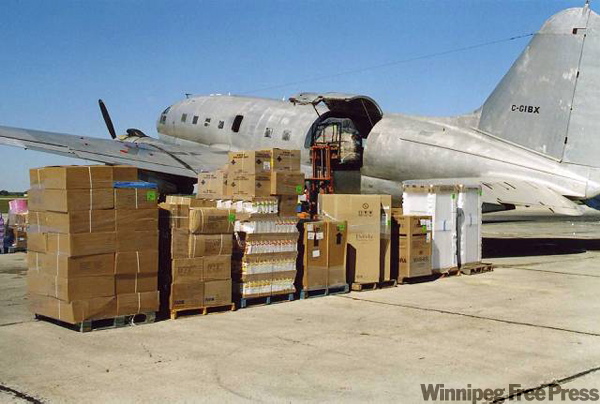First Nations Transportation banned from flying
20 people laid off while airline fights suspension
Advertisement
Read this article for free:
or
Already have an account? Log in here »
To continue reading, please subscribe:
Monthly Digital Subscription
$1 per week for 24 weeks*
- Enjoy unlimited reading on winnipegfreepress.com
- Read the E-Edition, our digital replica newspaper
- Access News Break, our award-winning app
- Play interactive puzzles
*Billed as $4.00 plus GST every four weeks. After 24 weeks, price increases to the regular rate of $19.95 plus GST every four weeks. Offer available to new and qualified returning subscribers only. Cancel any time.
Monthly Digital Subscription
$4.99/week*
- Enjoy unlimited reading on winnipegfreepress.com
- Read the E-Edition, our digital replica newspaper
- Access News Break, our award-winning app
- Play interactive puzzles
*Billed as $19.95 plus GST every four weeks. Cancel any time.
To continue reading, please subscribe:
Add Free Press access to your Brandon Sun subscription for only an additional
$1 for the first 4 weeks*
*Your next subscription payment will increase by $1.00 and you will be charged $16.99 plus GST for four weeks. After four weeks, your payment will increase to $23.99 plus GST every four weeks.
Read unlimited articles for free today:
or
Already have an account? Log in here »
Hey there, time traveller!
This article was published 09/07/2009 (6036 days ago), so information in it may no longer be current.
A Gimli-based airline has been grounded and more than 20 employees laid off after Transport Canada suspended the company’s air operator certificate last week.
First Nations Transportation serves eight remote communities on the east side of Lake Winnipeg, including St. Theresa Point and Garden Hill First Nations, which are also major shareholders. The freight company runs an estimated 10 flights per week to deliver 68,000 kilograms of supplies.
General manager Fred Petrie said Transport Canada suspended the aircraft operator certificate July 2 over alleged "deficiencies in our documentation." Petrie said he expects to have those issues cleared up by next week. But he said First Nations Transportation will be grounded for the summer over a new government requirement that planes be equipped with "collision avoidance systems," a type of safety equipment. The requirement was announced in 2007 and took effect July 1, Transport Canada said. Petrie said he initially thought his older planes weren’t included, but later learned otherwise. A request for more time was denied, and it will take until August to get the new equipment.

"We’re working diligently to meet Transport Canada’s requirements," Petrie said. "We’re working very hard to save the company at all."
Transport Canada spokeswoman Andrea Rudniski said the department suspended First Nations Transportation’s certificate after a recent inspection and the company’s "history of non-compliance." She said an inspection in January found "deficiencies" in the company’s operational control system, which makes sure a company follows day-to-day safety requirements in areas such as training and dispatching.
First Nations Transportation addressed those issues and was allowed to fly again, she said, but an inspection in June found deficiencies in the same area, as well as in its quality-assurance program.
"The safety deficiencies in both systems were quite significant, which resulted in our suspension," she said.
Rudniski said she couldn’t discuss specifics of the suspension since the company can appeal it.
She said hypothetical deficiencies could include failing to keep records of training or aircraft maintenance.
Petrie said his planes, a 1940s Curtiss C-46 Commando and a trio of DC-3s, might be older, but are still safe. They’re the only aircraft that can handle the short gravel runways in remote communities, he said. The planes are worth $250,000 each, but he said the new equipment will cost upwards of $100,000 per plane.
Even if the company comes up with a plan to tackle the problems that led to the suspension, the planes won’t be able to fly again without the new safety equipment or submitting a new request for an exemption, Rudniski said.
An earlier request was rejected because it didn’t meet the criteria, including an outline of how the company would mitigate safety risks, she said.
First Nations Transportation does most of its business with the North West Company, which owns the Northern Stores that sell groceries in some northern communities. A spokesman said the stores are using another carrier and it’s business as usual.
Petrie said his company has appealed the January suspension, and is awaiting information from Transport Canada requested in February.
"It’s all been very high-handed and unreasonable," said Petrie, who thinks cash penalties are tough enough. "There are other ways to do things without putting people out of business."
Petrie said he has hired consultants to examine the company’s regulatory compliance. The company might take legal action against the transportation department, depending on the findings.
lindsey.wiebe@freepress.mb.ca


